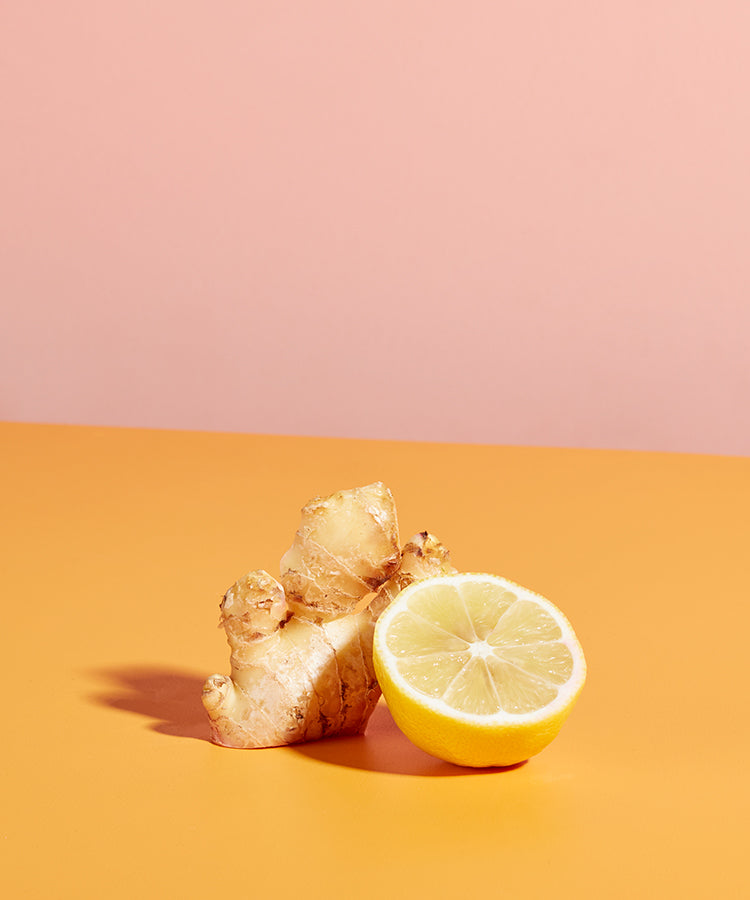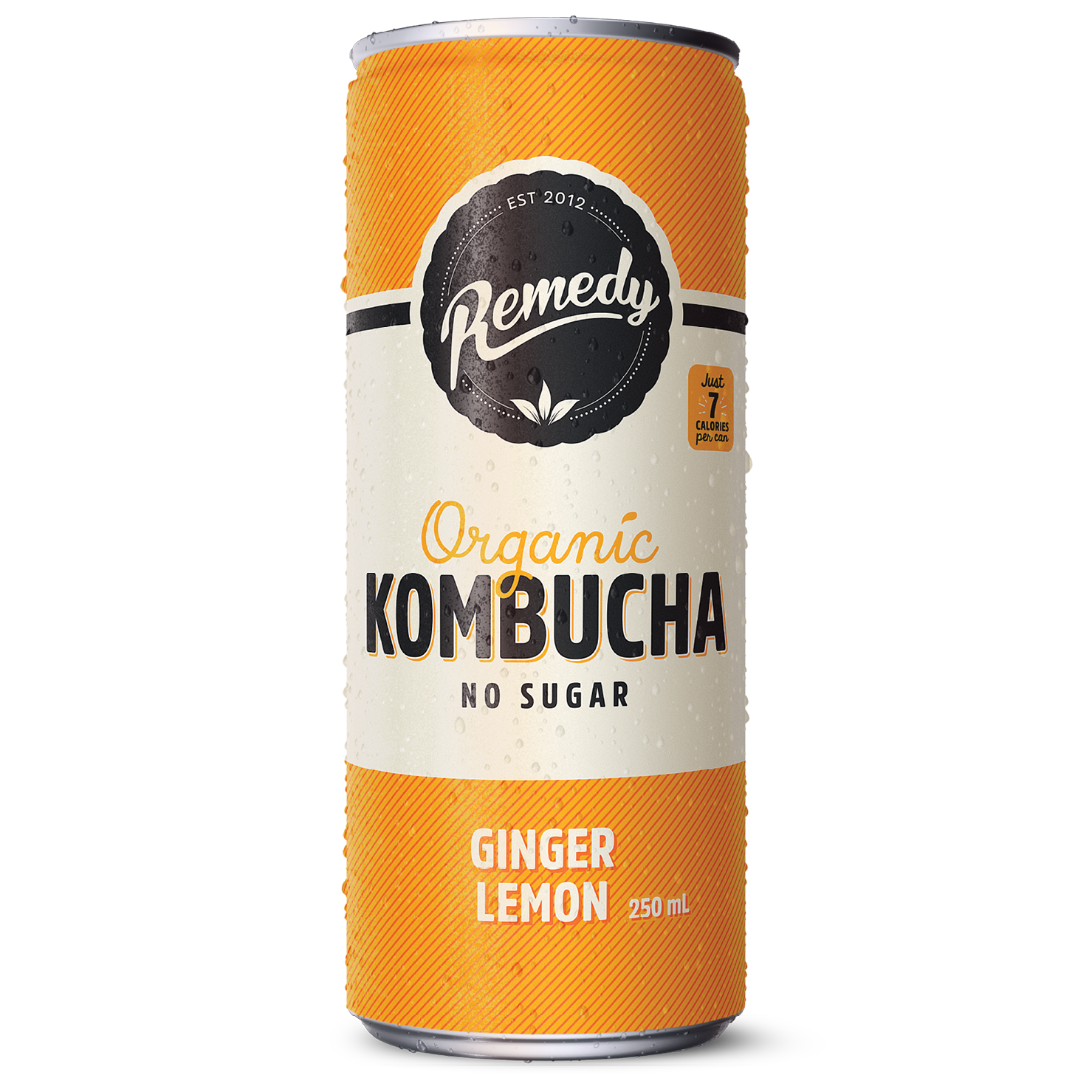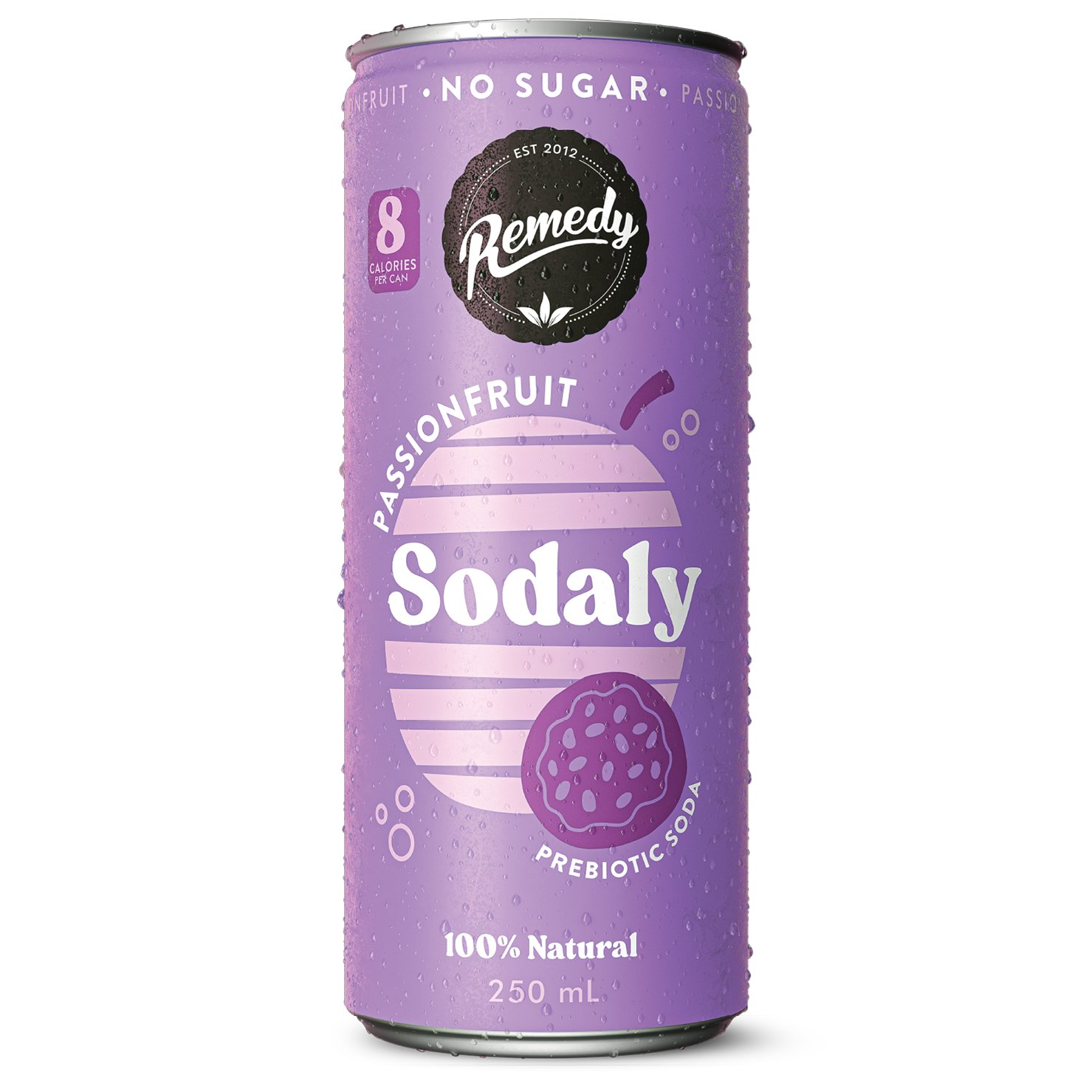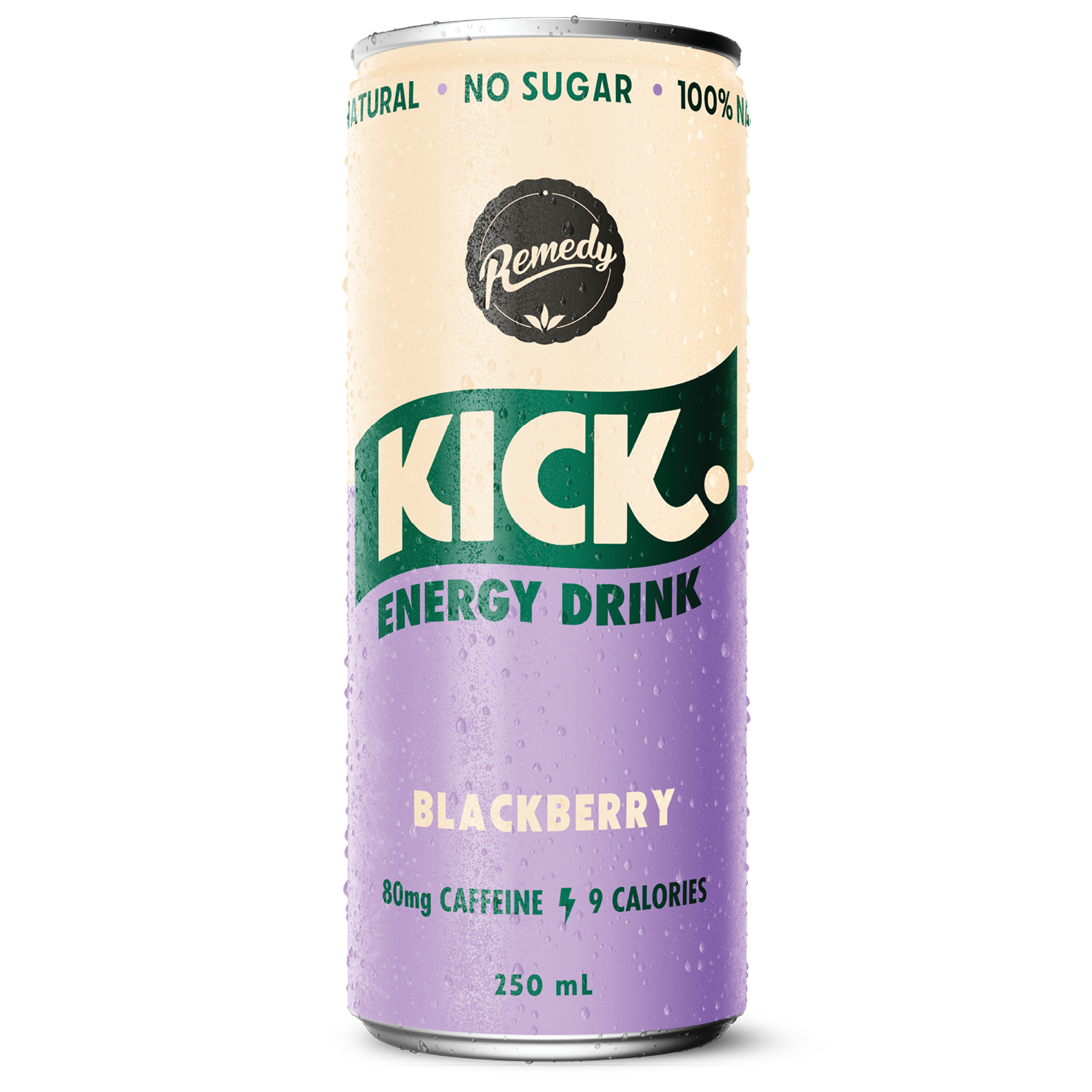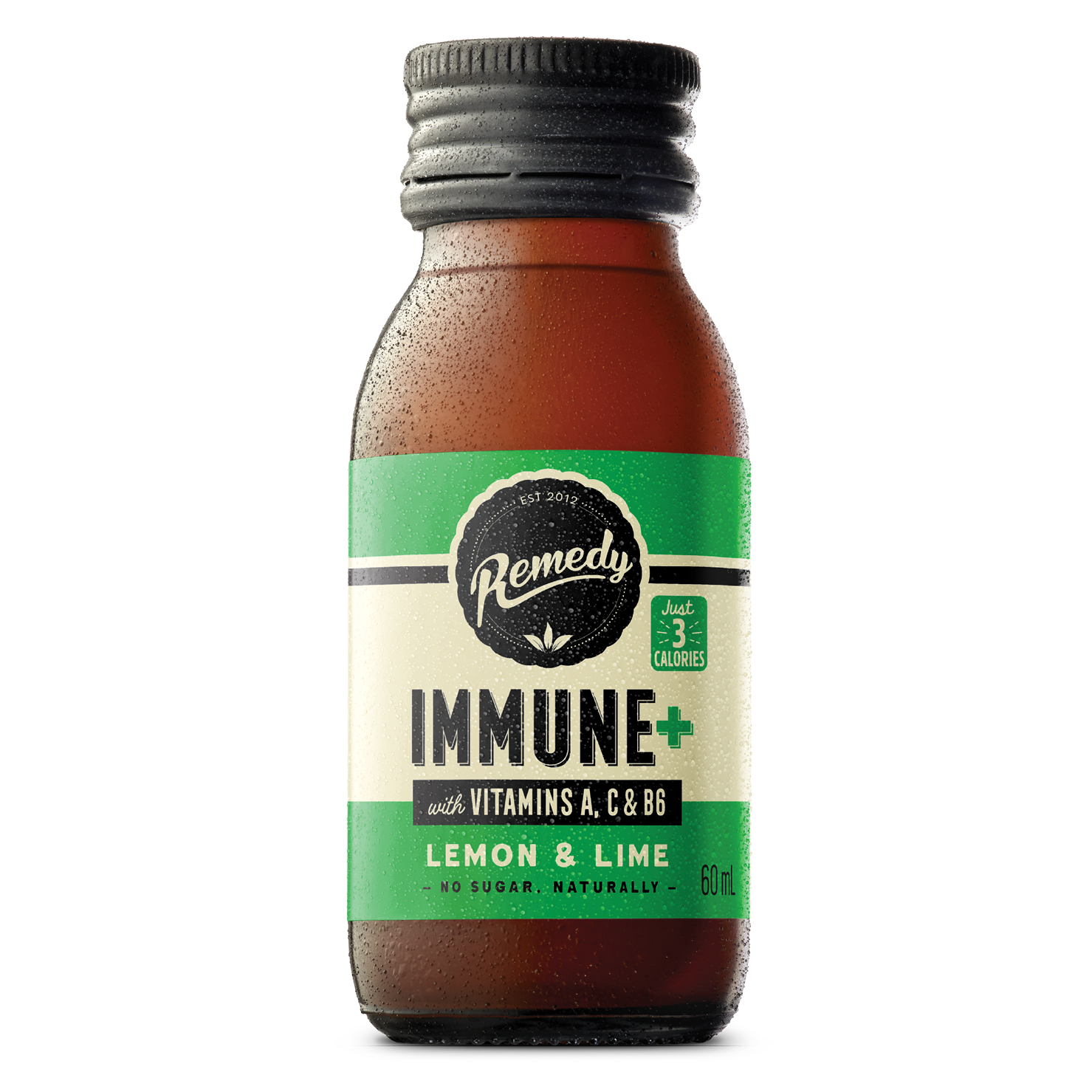Remedy Drinks Ingredients | No Sugar, All Natural Drinks
Green tea is made from the leaves of Camellia sinensis that have not undergone the same oxidation process used to make black tea and oolong tea. It is native to China and India and has been consumed for centuries for its delish flavour and benefits. The potential health benefits of green tea are mainly attributed to its high content of catechins, a type of antioxidant.
In kombucha making, the first and very important step at Remedy is to brew a huge pot of tea. We use organic green tea in our kombucha brew for its high polyphenol properties. We test samples of each batch of tea we use to ensure it contains the high level of polyphenols (antioxidants) we’re after.
WHY PEOPLE LOVE IT
-
Consuming green tea may be associated with a lower risk of cardiovascular disease due to its potential effects on cholesterol levels and blood pressure.
-
Green tea may boost metabolic rate and fat burning, potentially aiding in weight loss and enhancing physical performance.
-
The antioxidant properties of green tea have been linked to a lower risk of various types of cancer in some studies.
WHAT REMEDY BEVVIES IT'S IN
Remedy Kombucha Ginger Lemon
Remedy Kombucha Raspberry Lemonade
Remedy Kombucha Wild Berry
Remedy Kombucha Mango Passion
Remedy Kombucha Cherry Plum
Remedy Kombucha Peach
REFERENCES
Kuriyama, S., Shimazu, T., Ohmori, K., Kikuchi, N., Nakaya, N., Nishino, Y., Tsubono, Y., & Tsuji, I. (2006). Green Tea Consumption and Mortality Due to Cardiovascular Disease, Cancer, and All Causes in Japan: The Ohsaki Study. JAMA, 296(10), 1255–1265.
Yang, C. S., Wang, X., Lu, G., & Picinich, S. C. (2009). Cancer prevention by tea: animal studies, molecular mechanisms and human relevance. Nature Reviews Cancer, 9(6), 429-439.
Hursel, R., Viechtbauer, W., & Westerterp-Plantenga, M. S. (2009). The effects of green tea on weight loss and weight maintenance: a meta-analysis. International Journal of Obesity, 33(9), 956-961.
Green tea is made from the leaves of Camellia sinensis that have not undergone the same oxidation process used to make black tea and oolong tea. It is native to China and India and has been consumed for centuries for its delish flavour and benefits. The potential health benefits of green tea are mainly attributed to its high content of catechins, a type of antioxidant.
In kombucha making, the first and very important step at Remedy is to brew a huge pot of tea. We use organic green tea in our kombucha brew for its high polyphenol properties. We test samples of each batch of tea we use to ensure it contains the high level of polyphenols (antioxidants) we’re after.
WHY PEOPLE LOVE IT
-
Consuming green tea may be associated with a lower risk of cardiovascular disease due to its potential effects on cholesterol levels and blood pressure.
-
Green tea may boost metabolic rate and fat burning, potentially aiding in weight loss and enhancing physical performance.
-
The antioxidant properties of green tea have been linked to a lower risk of various types of cancer in some studies.
WHAT REMEDY BEVVIES IT'S IN
Remedy Kombucha Ginger Lemon
Remedy Kombucha Raspberry Lemonade
Remedy Kombucha Wild Berry
Remedy Kombucha Mango Passion
Remedy Kombucha Cherry Plum
Remedy Kombucha Peach
REFERENCES
Kuriyama, S., Shimazu, T., Ohmori, K., Kikuchi, N., Nakaya, N., Nishino, Y., Tsubono, Y., & Tsuji, I. (2006). Green Tea Consumption and Mortality Due to Cardiovascular Disease, Cancer, and All Causes in Japan: The Ohsaki Study. JAMA, 296(10), 1255–1265.
Yang, C. S., Wang, X., Lu, G., & Picinich, S. C. (2009). Cancer prevention by tea: animal studies, molecular mechanisms and human relevance. Nature Reviews Cancer, 9(6), 429-439.
Hursel, R., Viechtbauer, W., & Westerterp-Plantenga, M. S. (2009). The effects of green tea on weight loss and weight maintenance: a meta-analysis. International Journal of Obesity, 33(9), 956-961.
Black tea is more oxidized than green, oolong, and white teas. It is made from the leaves of the Camellia sinensis plant, undergoing a process that includes withering (sounds funny, we know), rolling, fermentation (or oxidation), and drying. This process is what gives black tea its characteristic dark colour and strong flavour. Black tea is the most common type of tea consumed worldwide (black, no sugar for us, thanks!).
In kombucha making, the first and very important step at Remedy is to brew a huge pot of tea. We use organic black tea in our kombucha brew for its rich superior taste.
Remedy Kombucha contains 23mg of tea polyphenols per 100ml serve. We use only the best quality tea, which is why our brews pack a punch of tea polyphenols.
WHY PEOPLE LOVE IT
-
Consuming black tea may help reduce several risk factors for heart disease, including high blood pressure, high cholesterol levels, and elevated triglyceride levels.
-
Consuming black tea on a moderate basis may be associated with a reduced risk of type 2 diabetes by improving insulin sensitivity.
-
Black tea contains a group of polyphenols, including catechins, theaflavins, and thearubigins, which have antioxidant properties that may help to reduce cell damage in the body.
WHAT REMEDY BEVVIES IT'S IN
Remedy Kombucha Ginger Lemon
Remedy Kombucha Raspberry Lemonade
Remedy Kombucha Wild Berry
Remedy Kombucha Mango Passion
Remedy Kombucha Cherry Plum
Remedy Kombucha Peach
REFERENCES
Arab, L., Liu, W., & Elashoff, D. (2009). Green and black tea consumption and risk of stroke: a meta-analysis. Stroke, 40(5), 1786-1792.
Jing, Y., Han, G., Hu, Y., Bi, Y., Li, L., & Zhu, D. (2009). Tea consumption and risk of type 2 diabetes: a meta-analysis of cohort studies. Journal of General Internal Medicine, 24(5), 557-562.
Leung, L. K., Su, Y., Chen, R., Zhang, Z., Huang, Y., & Chen, Z. Y. (2001). Theaflavins in black tea and catechins in green tea are equally effective antioxidants. The Journal of Nutrition, 131(9), 2248-2251.
Erythritol (aka fermented glucose) is a naturally occurring nectar commonly found in pears, watermelons, grapes and other fermented products like wine, cheese and soy sauce. Erythritol is about 70% as sweet as table sugar (sucrose), but it has almost no calories (winner winner, chicken dinner) and is non-glycaemic, meaning it does not raise blood sugar levels. This makes it a popular choice among people with diabetes and those following low-carb diets.
We add a touch of erythritol at the end of the natural fermentation process. This adds back a touch of sweetness and balances out the flavours after we naturally brew out all of the sugar from our bevvies. The erythritol we use is 100% natural and certified organic.
WHY PEOPLE LOVE IT
- Erythritol is a low-calorie sweetener, which may be beneficial for weight management and for people on calorie-restricted diets.
- It does not affect blood glucose or insulin levels, making it a suitable sweetener for people with diabetes (yay!).
- This nifty sweetener may improve oral health by preventing the growth of harmful bacteria that cause tooth decay and cavities.
WHAT REMEDY BEVVIES IT'S IN
Remedy Kombucha Ginger Lemon
Remedy Kombucha Raspberry Lemonade
Remedy Kombucha Wild Berry
Remedy Kombucha Mango Passion
Remedy Kombucha Cherry Plum
Remedy Kombucha Peach
REFERENCES
Livesey, G. (2003). Health potential of polyols as sugar replacers, with emphasis on low glycaemic properties. Nutrition Research Reviews, 16(2), 163-191. (https://doi.org/10.1079/NRR200371)
Ishikawa, M., Miyashita, M., Kawashima, Y., Nakamura, T., Saitou, N., & Modderman, J. (1996). Effects of oral administration of erythritol on patients with diabetes. Regulatory Toxicology and Pharmacology, 24(2 Pt 2), S303-S308. (https://doi.org/10.1006/rtph.1996.0116)
de Cock, P., Mäkinen, K., Honkala, E., Saag, M., Kennepohl, E., & Eapen, A. (2016). Erythritol Is More Effective Than Xylitol and Sorbitol in Managing Oral Health Endpoints. International journal of dentistry, 2016, 9868421. (https://doi.org/10.1155/2016/9868421)
Stevia is a plant that belongs to the chrysanthemum family, which is native to Paraguay and Brazil. It contains no fructose yet is 300 times sweeter than sugar. We add a touch of stevia at the end of the natural fermentation process. This adds back a touch of sweetness and balances out the flavours after we naturally brew out all of the sugar from our bevvies.
It's a popular sweetener among diabetics and those on carbohydrate-controlled diets.
WHY PEOPLE LOVE IT
-
Stevia does not raise blood glucose levels, making it a great option for those with diabetes to enjoy the sweet taste without negative effects of sugar (woop woop!).
-
It provides sweetness without contributing to calorie intake, which may be beneficial for those managing their weight or on a calorie-restricted diet.
-
Unlike sugar, stevia may not contribute to teeth decay, as it doesn’t provide a food source for oral bacteria.
WHAT REMEDY BEVVIES IT'S IN
Remedy Kombucha Ginger Lemon
Remedy Kombucha Raspberry Lemonade
Remedy Kombucha Wild Berry
Remedy Kombucha Mango Passion
Remedy Kombucha Cherry Plum
Remedy Kombucha Peach
REFERENCES
Rogers, P. J., Hogenkamp, P. S., de Graaf, C., Higgs, S., Lluch, A., Ness, A. R., Penfold, C., Perry, R., Putz, P., Yeomans, M. R., & Mela, D. J. (2016). Does low-energy sweetener consumption affect energy intake and body weight? A systematic review, including meta-analyses, of the evidence from human and animal studies. International journal of obesity, 40(3), 381–394. (https://doi.org/10.1038/ijo.2015.177)
Anton, S. D., Martin, C. K., Han, H., Coulon, S., Cefalu, W. T., Geiselman, P., & Williamson, D. A. (2010). Effects of stevia, aspartame, and sucrose on food intake, satiety, and postprandial glucose and insulin levels. Appetite, 55(1), 37-43. (https://doi.org/10.1016/j.appet.2010.03.009)
Blagojevic, N., Djekic, S., & Sabbah, W. (2019). The oral health effects of sugar-sweetened beverages: a review. Journal of Dentistry, 85, 15-25. (https://doi.org/10.1016/j.jdent.2019.04.004)
A lemon is a type of small evergreen tree native to Asia, as well as the fruit produced by this tree. The fruit is used for culinary and non-culinary purposes throughout the world – primarily for its juice, though the pulp and rind (zest) are also used, primarily in cooking and baking. Lemons are a rich source of vitamin C and contain smaller amounts of several other vitamins and minerals. Their distinct, sharp, acidic taste makes them a popular ingredient in drinks and foods.
We use real lemon juice in our Remedy bevvies as it's low in fermentable sugar, meaning we don't risk our bevvies refermenting and becoming alcoholic (we like to save that for our weekend vinos!)
WHY PEOPLE LOVE IT
-
Lemon juice is an excellent source of Vitamin C, a potent antioxidant that may help to protect cells from damaging free radicals. It also supports immune function and enhances iron absorption in the body.
-
May aid in digestion. Some research indicates that the citric acid in lemons may help supplement the stomach's natural acids, which can improve digestion and nutrient absorption.
-
Several studies have suggested that lemon juice and its extracts may promote weight loss.
WHAT REMEDY BEVVIES IT'S IN
Remedy Kombucha Ginger Lemon
Remedy Kombucha Raspberry Lemonade
Remedy Kombucha Wild Berry
Remedy Kombucha Mango Passion
REFERENCES
Ran, L., Zhao, W., Wang, J., Wang, H., Zhao, Y., Tseng, Y., & Bu, H. (2018). Extra Dose of Vitamin C Based on a Daily Supplementation Shortens the Common Cold: A Meta-Analysis of 9 Randomized Controlled Trials. BioMed Research International, 2018, 1837634. https://doi.org/10.1155/2018/1837634
Urita, Y., Watanabe, T., Watanabe, K., Higuchi, K., Tanaka, J., Mizuno, M., Ishii, H. (2009). Role of Citric Acid in L-Phe Absorption in Rat Small Intestine. Digestive Diseases and Sciences, 54(4), 854–859. doi: 10.1007/s10620-008-0453-4.
Fukuchi, Y., Hiramitsu, M., Okada, M., Hayashi, S., Nabeno, Y., Osawa, T., & Naito, M. (2008). Lemon Polyphenols Suppress Diet-induced Obesity by Up-Regulation of mRNA Levels of the Enzymes Involved in β-Oxidation in Mouse White Adipose Tissue. Journal of Clinical Biochemistry and Nutrition, 43(3), 201–209. https://doi.org/10.3164/jcbn.2008066
Saito, S., & Yoneshiro, T. (2013). Capsinoids and related food ingredients activating brown fat thermogenesis and reducing body fat in humans. Current Opinion in Lipidology, 24(1), 71–77. https://doi.org/10.1097/MOL.0b013e32835a4f40
Ginger (Zingiber officinale) is a flowering plant whose rhizome, or ginger root, is widely used as a spice and in traditional medicine. Originating from Southeast Asia, ginger has a long history of use in various forms of traditional and alternative medicine. It has a very distinct flavour, which can be described as hot, zesty, and sweetly aromatic. Its unique fragrance and flavour are due to its natural oils, the most important of which is gingerol.
Gingerol is the main bioactive compound in ginger, responsible for many of its medicinal properties, such as its anti-inflammatory and antioxidant effects.
At Remedy, we buy fresh ginger and crush it on site! Sometimes it's only been out of the ground for 3 days before it's in our bottles and cans. We like to think that's what makes our ginger bevvies taste so darn' good.
WHY PEOPLE LOVE IT
-
Ginger can provide gastrointestinal relief and may help alleviate symptoms of nausea and vomiting. Yep, your nan was onto something!
-
It may have inflammatory and anti-oxidative effects that can help reduce inflammation in the body.
-
Ginger also contains antioxidants, which may help to neutralise harmful free radicals in the body and reduce oxidative stress.
WHAT REMEDY BEVVIES IT'S IN
REFERENCES
Ernst, E., & Pittler, M. H. (2000). Efficacy of ginger for nausea and vomiting: a systematic review of randomized clinical trials. British journal of anaesthesia, 84(3), 367–371. (https://doi.org/10.1093/oxfordjournals.bja.a013442)
Grzanna, R., Lindmark, L., & Frondoza, C. G. (2005). Ginger—an herbal medicinal product with broad anti-inflammatory actions. Journal of medicinal food, 8(2), 125–132. (https://doi.org/10.1089/jmf.2005.8.125)
Mashhadi, N. S., Ghiasvand, R., Askari, G., Hariri, M., Darvishi, L., & Mofid, M. R. (2013). Anti-oxidative and anti-inflammatory effects of ginger in health and physical activity: review of current evidence. International journal of preventive medicine, 4(Suppl 1), S36–S42. (https://www.ncbi.nlm.nih.gov/pmc/articles/PMC3665023/)
The Kakadu Plum, also known as Gubinge, Billygoat Plum or Murunga, is a native Australian fruit. The fruit is small, about the size of an olive or cherry, and green in color. The plant is found in the woodlands of Northern Australia. It has been used for thousands of years by Indigenous Australians for its nutrient-rich and medicinal properties. It's known to have a tart taste, and it's often used in sauces, relishes, and gourmet jams, as well as in skincare and pharmaceuticals due to its high antioxidant properties.
The Kakadu plum we use is from the Palngun Wurnangat Association (PWA), a women’s organisation based in Wadeye, Northern Territory. Wadeye has the largest Aboriginal community in Australia.
WHY PEOPLE LOVE IT
-
Kakadu plums have been found to contain up to 100 times the vitamin C of an orange, making them nature's richest source of this essential vitamin
-
Kakadu plums are rich in antioxidants, which may help combat oxidative stress in the body
-
Kakadu plum extracts possess anti-inflammatory and antimicrobial properties, which can be beneficial in preventing and treating a variety of health conditions
WHAT REMEDY BEVVIES IT'S IN
REFERENCES
Netzel, M., Netzel, G., Tian, Q., Schwartz, S., & Konczak, I. (2007). Native Australian fruits - a novel source of antioxidants for food. Innovative Food Science & Emerging Technologies, 8(3), 339-346. https://doi.org/10.1016/j.ifset.2007.01.004
Cock, I. E. (2016). The medicinal properties and phytochemistry of plants of the genus Terminalia (Combretaceae). Inflammopharmacology, 24(5), 187–201. https://doi.org/10.1007/s10787-016-0280-4
Konczak, I., Zabaras, D., Dunstan, M., Aguas, P., Antos, M., & Roulfe, P. (2010). Health benefits of Australian native foods – An evaluation of health-enhancing compounds. RIRDC Publication No 10/133, 1-84. https://www.agrifutures.com.au/wp-content/uploads/publications/10-133.pdf
Hibiscus tea is an herbal tea made by infusing the dried petals of the hibiscus flower in hot water. The resulting drink is bright red in colour and has a tart, cranberry-like flavour. This beverage is enjoyed both hot and cold and is known for its high vitamin C content. Hibiscus tea is consumed worldwide and is especially popular in North Africa and Central America.
At Remedy, we use brew big pots of hibiscus tea to add a natural pink/red colour to our bevvies. There's no use of artificial colours here!
WHY PEOPLE LOVE IT
-
It can help lower blood pressure in prehypertensive and mildly hypertensive adults, which may reduce the risk of heart disease.
-
Hibiscus tea is high in powerful antioxidants that help protect against cell damage and reduce inflammation.
-
Some studies have found that hibiscus extract might have a protective effect on the liver, increasing detoxification enzymes and reducing liver damage.
WHAT REMEDY BEVVIES IT'S IN
Remedy Kombucha Raspberry Lemonade
Remedy Kombucha Wild Berry
Remedy Kombucha Cherry Plum
REFERENCES
McKay, D. L., Chen, C. Y. O., Saltzman, E., & Blumberg, J. B. (2010). Hibiscus Sabdariffa L. Tea (Tisane) Lowers Blood Pressure in Prehypertensive and Mildly Hypertensive Adults. Journal of Nutrition, 140(2), 298–303. https://doi.org/10.3945/jn.109.115097
Alarcon-Aguilar, F. J., Zamilpa, A., Perez-Garcia, M. D., Almanza-Perez, J. C., Romero-Nuñez, E., Campos-Sepulveda, E. A., & Roman-Ramos, R. (2007). Effect of Hibiscus sabdariffa on obesity in MSG mice. Journal of Ethnopharmacology, 114(1), 66–71. https://doi.org/10.1016/j.jep.2007.07.020
Tseng, T. H., Kao, E. S., Chu, C. Y., Chou, F. P., Lin Wu, H. W., & Wang, C. J. (2000). Protective effects of dried flower extracts of Hibiscus sabdariffa L. against oxidative stress in rat primary hepatocytes. Food and Chemical Toxicology, 38(11), 1013–1018. https://doi.org/10.1016/S0278-6915(00)00093-8
Erythritol (aka fermented glucose) is a naturally occurring nectar commonly found in pears, watermelons, grapes and other fermented products like wine, cheese and soy sauce. Erythritol is about 70% as sweet as table sugar (sucrose), but it has almost no calories (winner winner, chicken dinner) and is non-glycaemic, meaning it does not raise blood sugar levels. This makes it a popular choice among people with diabetes and those following low-carb diets.
We add a touch of erythritol at the end of the natural fermentation process. This adds back a touch of sweetness and balances out the flavours after we naturally brew out all of the sugar from our bevvies. The erythritol we use is 100% natural and certified organic.
WHY PEOPLE LOVE IT
- Erythritol is a low-calorie sweetener, which may be beneficial for weight management and for people on calorie-restricted diets.
- It does not affect blood glucose or insulin levels, making it a suitable sweetener for people with diabetes (yay!).
- This nifty sweetener may improve oral health by preventing the growth of harmful bacteria that cause tooth decay and cavities.
WHAT REMEDY BEVVIES IT'S IN
Remedy Kombucha Ginger Lemon
Remedy Kombucha Raspberry Lemonade
Remedy Kombucha Wild Berry
Remedy Kombucha Mango Passion
Remedy Kombucha Cherry Plum
Remedy Kombucha Peach
REFERENCES
Livesey, G. (2003). Health potential of polyols as sugar replacers, with emphasis on low glycaemic properties. Nutrition Research Reviews, 16(2), 163-191. (https://doi.org/10.1079/NRR200371)
Ishikawa, M., Miyashita, M., Kawashima, Y., Nakamura, T., Saitou, N., & Modderman, J. (1996). Effects of oral administration of erythritol on patients with diabetes. Regulatory Toxicology and Pharmacology, 24(2 Pt 2), S303-S308. (https://doi.org/10.1006/rtph.1996.0116)
de Cock, P., Mäkinen, K., Honkala, E., Saag, M., Kennepohl, E., & Eapen, A. (2016). Erythritol Is More Effective Than Xylitol and Sorbitol in Managing Oral Health Endpoints. International journal of dentistry, 2016, 9868421. (https://doi.org/10.1155/2016/9868421)
Stevia is a plant that belongs to the chrysanthemum family, which is native to Paraguay and Brazil. It contains no fructose yet is 300 times sweeter than sugar. We add a touch of stevia at the end of the natural fermentation process. This adds back a touch of sweetness and balances out the flavours after we naturally brew out all of the sugar from our bevvies.
It's a popular sweetener among diabetics and those on carbohydrate-controlled diets.
WHY PEOPLE LOVE IT
-
Stevia does not raise blood glucose levels, making it a great option for those with diabetes to enjoy the sweet taste without negative effects of sugar (woop woop!).
-
It provides sweetness without contributing to calorie intake, which may be beneficial for those managing their weight or on a calorie-restricted diet.
-
Unlike sugar, stevia may not contribute to teeth decay, as it doesn’t provide a food source for oral bacteria.
WHAT REMEDY BEVVIES IT'S IN
Remedy Kombucha Ginger Lemon
Remedy Kombucha Raspberry Lemonade
Remedy Kombucha Wild Berry
Remedy Kombucha Mango Passion
Remedy Kombucha Cherry Plum
Remedy Kombucha Peach
REFERENCES
Rogers, P. J., Hogenkamp, P. S., de Graaf, C., Higgs, S., Lluch, A., Ness, A. R., Penfold, C., Perry, R., Putz, P., Yeomans, M. R., & Mela, D. J. (2016). Does low-energy sweetener consumption affect energy intake and body weight? A systematic review, including meta-analyses, of the evidence from human and animal studies. International journal of obesity, 40(3), 381–394. (https://doi.org/10.1038/ijo.2015.177)
Anton, S. D., Martin, C. K., Han, H., Coulon, S., Cefalu, W. T., Geiselman, P., & Williamson, D. A. (2010). Effects of stevia, aspartame, and sucrose on food intake, satiety, and postprandial glucose and insulin levels. Appetite, 55(1), 37-43. (https://doi.org/10.1016/j.appet.2010.03.009)
Blagojevic, N., Djekic, S., & Sabbah, W. (2019). The oral health effects of sugar-sweetened beverages: a review. Journal of Dentistry, 85, 15-25. (https://doi.org/10.1016/j.jdent.2019.04.004)
A lemon is a type of small evergreen tree native to Asia, as well as the fruit produced by this tree. The fruit is used for culinary and non-culinary purposes throughout the world – primarily for its juice, though the pulp and rind (zest) are also used, primarily in cooking and baking. Lemons are a rich source of vitamin C and contain smaller amounts of several other vitamins and minerals. Their distinct, sharp, acidic taste makes them a popular ingredient in drinks and foods.
We use real lemon juice in our Remedy bevvies as it's low in fermentable sugar, meaning we don't risk our bevvies refermenting and becoming alcoholic (we like to save that for our weekend vinos!)
WHY PEOPLE LOVE IT
-
Lemon juice is an excellent source of Vitamin C, a potent antioxidant that may help to protect cells from damaging free radicals. It also supports immune function and enhances iron absorption in the body.
-
May aid in digestion. Some research indicates that the citric acid in lemons may help supplement the stomach's natural acids, which can improve digestion and nutrient absorption.
-
Several studies have suggested that lemon juice and its extracts may promote weight loss.
WHAT REMEDY BEVVIES IT'S IN
Remedy Kombucha Ginger Lemon
Remedy Kombucha Raspberry Lemonade
Remedy Kombucha Wild Berry
Remedy Kombucha Mango Passion
REFERENCES
Ran, L., Zhao, W., Wang, J., Wang, H., Zhao, Y., Tseng, Y., & Bu, H. (2018). Extra Dose of Vitamin C Based on a Daily Supplementation Shortens the Common Cold: A Meta-Analysis of 9 Randomized Controlled Trials. BioMed Research International, 2018, 1837634. https://doi.org/10.1155/2018/1837634
Urita, Y., Watanabe, T., Watanabe, K., Higuchi, K., Tanaka, J., Mizuno, M., Ishii, H. (2009). Role of Citric Acid in L-Phe Absorption in Rat Small Intestine. Digestive Diseases and Sciences, 54(4), 854–859. doi: 10.1007/s10620-008-0453-4.
Fukuchi, Y., Hiramitsu, M., Okada, M., Hayashi, S., Nabeno, Y., Osawa, T., & Naito, M. (2008). Lemon Polyphenols Suppress Diet-induced Obesity by Up-Regulation of mRNA Levels of the Enzymes Involved in β-Oxidation in Mouse White Adipose Tissue. Journal of Clinical Biochemistry and Nutrition, 43(3), 201–209. https://doi.org/10.3164/jcbn.2008066
Saito, S., & Yoneshiro, T. (2013). Capsinoids and related food ingredients activating brown fat thermogenesis and reducing body fat in humans. Current Opinion in Lipidology, 24(1), 71–77. https://doi.org/10.1097/MOL.0b013e32835a4f40
Black tea is more oxidized than green, oolong, and white teas. It is made from the leaves of the Camellia sinensis plant, undergoing a process that includes withering (sounds funny, we know), rolling, fermentation (or oxidation), and drying. This process is what gives black tea its characteristic dark colour and strong flavour. Black tea is the most common type of tea consumed worldwide (black, no sugar for us, thanks!).
In kombucha making, the first and very important step at Remedy is to brew a huge pot of tea. We use organic black tea in our kombucha brew for its rich superior taste.
Remedy Kombucha contains 23mg of tea polyphenols per 100ml serve. We use only the best quality tea, which is why our brews pack a punch of tea polyphenols.
WHY PEOPLE LOVE IT
-
Consuming black tea may help reduce several risk factors for heart disease, including high blood pressure, high cholesterol levels, and elevated triglyceride levels.
-
Consuming black tea on a moderate basis may be associated with a reduced risk of type 2 diabetes by improving insulin sensitivity.
-
Black tea contains a group of polyphenols, including catechins, theaflavins, and thearubigins, which have antioxidant properties that may help to reduce cell damage in the body.
WHAT REMEDY BEVVIES IT'S IN
Remedy Kombucha Ginger Lemon
Remedy Kombucha Raspberry Lemonade
Remedy Kombucha Wild Berry
Remedy Kombucha Mango Passion
Remedy Kombucha Cherry Plum
Remedy Kombucha Peach
REFERENCES
Arab, L., Liu, W., & Elashoff, D. (2009). Green and black tea consumption and risk of stroke: a meta-analysis. Stroke, 40(5), 1786-1792.
Jing, Y., Han, G., Hu, Y., Bi, Y., Li, L., & Zhu, D. (2009). Tea consumption and risk of type 2 diabetes: a meta-analysis of cohort studies. Journal of General Internal Medicine, 24(5), 557-562.
Leung, L. K., Su, Y., Chen, R., Zhang, Z., Huang, Y., & Chen, Z. Y. (2001). Theaflavins in black tea and catechins in green tea are equally effective antioxidants. The Journal of Nutrition, 131(9), 2248-2251.
Green tea is made from the leaves of Camellia sinensis that have not undergone the same oxidation process used to make black tea and oolong tea. It is native to China and India and has been consumed for centuries for its delish flavour and benefits. The potential health benefits of green tea are mainly attributed to its high content of catechins, a type of antioxidant.
In kombucha making, the first and very important step at Remedy is to brew a huge pot of tea. We use organic green tea in our kombucha brew for its high polyphenol properties. We test samples of each batch of tea we use to ensure it contains the high level of polyphenols (antioxidants) we’re after.
WHY PEOPLE LOVE IT
-
Consuming green tea may be associated with a lower risk of cardiovascular disease due to its potential effects on cholesterol levels and blood pressure.
-
Green tea may boost metabolic rate and fat burning, potentially aiding in weight loss and enhancing physical performance.
-
The antioxidant properties of green tea have been linked to a lower risk of various types of cancer in some studies.
WHAT REMEDY BEVVIES IT'S IN
Remedy Kombucha Ginger Lemon
Remedy Kombucha Raspberry Lemonade
Remedy Kombucha Wild Berry
Remedy Kombucha Mango Passion
Remedy Kombucha Cherry Plum
Remedy Kombucha Peach
REFERENCES
Kuriyama, S., Shimazu, T., Ohmori, K., Kikuchi, N., Nakaya, N., Nishino, Y., Tsubono, Y., & Tsuji, I. (2006). Green Tea Consumption and Mortality Due to Cardiovascular Disease, Cancer, and All Causes in Japan: The Ohsaki Study. JAMA, 296(10), 1255–1265.
Yang, C. S., Wang, X., Lu, G., & Picinich, S. C. (2009). Cancer prevention by tea: animal studies, molecular mechanisms and human relevance. Nature Reviews Cancer, 9(6), 429-439.
Hursel, R., Viechtbauer, W., & Westerterp-Plantenga, M. S. (2009). The effects of green tea on weight loss and weight maintenance: a meta-analysis. International Journal of Obesity, 33(9), 956-961.
Erythritol (aka fermented glucose) is a naturally occurring nectar commonly found in pears, watermelons, grapes and other fermented products like wine, cheese and soy sauce. Erythritol is about 70% as sweet as table sugar (sucrose), but it has almost no calories (winner winner, chicken dinner) and is non-glycaemic, meaning it does not raise blood sugar levels. This makes it a popular choice among people with diabetes and those following low-carb diets.
We add a touch of erythritol at the end of the natural fermentation process. This adds back a touch of sweetness and balances out the flavours after we naturally brew out all of the sugar from our bevvies. The erythritol we use is 100% natural and certified organic.
WHY PEOPLE LOVE IT
- Erythritol is a low-calorie sweetener, which may be beneficial for weight management and for people on calorie-restricted diets.
- It does not affect blood glucose or insulin levels, making it a suitable sweetener for people with diabetes (yay!).
- This nifty sweetener may improve oral health by preventing the growth of harmful bacteria that cause tooth decay and cavities.
WHAT REMEDY BEVVIES IT'S IN
Remedy Kombucha Ginger Lemon
Remedy Kombucha Raspberry Lemonade
Remedy Kombucha Wild Berry
Remedy Kombucha Mango Passion
Remedy Kombucha Cherry Plum
Remedy Kombucha Peach
REFERENCES
Livesey, G. (2003). Health potential of polyols as sugar replacers, with emphasis on low glycaemic properties. Nutrition Research Reviews, 16(2), 163-191. (https://doi.org/10.1079/NRR200371)
Ishikawa, M., Miyashita, M., Kawashima, Y., Nakamura, T., Saitou, N., & Modderman, J. (1996). Effects of oral administration of erythritol on patients with diabetes. Regulatory Toxicology and Pharmacology, 24(2 Pt 2), S303-S308. (https://doi.org/10.1006/rtph.1996.0116)
de Cock, P., Mäkinen, K., Honkala, E., Saag, M., Kennepohl, E., & Eapen, A. (2016). Erythritol Is More Effective Than Xylitol and Sorbitol in Managing Oral Health Endpoints. International journal of dentistry, 2016, 9868421. (https://doi.org/10.1155/2016/9868421)
Stevia is a plant that belongs to the chrysanthemum family, which is native to Paraguay and Brazil. It contains no fructose yet is 300 times sweeter than sugar. We add a touch of stevia at the end of the natural fermentation process. This adds back a touch of sweetness and balances out the flavours after we naturally brew out all of the sugar from our bevvies.
It's a popular sweetener among diabetics and those on carbohydrate-controlled diets.
WHY PEOPLE LOVE IT
-
Stevia does not raise blood glucose levels, making it a great option for those with diabetes to enjoy the sweet taste without negative effects of sugar (woop woop!).
-
It provides sweetness without contributing to calorie intake, which may be beneficial for those managing their weight or on a calorie-restricted diet.
-
Unlike sugar, stevia may not contribute to teeth decay, as it doesn’t provide a food source for oral bacteria.
WHAT REMEDY BEVVIES IT'S IN
Remedy Kombucha Ginger Lemon
Remedy Kombucha Raspberry Lemonade
Remedy Kombucha Wild Berry
Remedy Kombucha Mango Passion
Remedy Kombucha Cherry Plum
Remedy Kombucha Peach
REFERENCES
Rogers, P. J., Hogenkamp, P. S., de Graaf, C., Higgs, S., Lluch, A., Ness, A. R., Penfold, C., Perry, R., Putz, P., Yeomans, M. R., & Mela, D. J. (2016). Does low-energy sweetener consumption affect energy intake and body weight? A systematic review, including meta-analyses, of the evidence from human and animal studies. International journal of obesity, 40(3), 381–394. (https://doi.org/10.1038/ijo.2015.177)
Anton, S. D., Martin, C. K., Han, H., Coulon, S., Cefalu, W. T., Geiselman, P., & Williamson, D. A. (2010). Effects of stevia, aspartame, and sucrose on food intake, satiety, and postprandial glucose and insulin levels. Appetite, 55(1), 37-43. (https://doi.org/10.1016/j.appet.2010.03.009)
Blagojevic, N., Djekic, S., & Sabbah, W. (2019). The oral health effects of sugar-sweetened beverages: a review. Journal of Dentistry, 85, 15-25. (https://doi.org/10.1016/j.jdent.2019.04.004)
A lemon is a type of small evergreen tree native to Asia, as well as the fruit produced by this tree. The fruit is used for culinary and non-culinary purposes throughout the world – primarily for its juice, though the pulp and rind (zest) are also used, primarily in cooking and baking. Lemons are a rich source of vitamin C and contain smaller amounts of several other vitamins and minerals. Their distinct, sharp, acidic taste makes them a popular ingredient in drinks and foods.
We use real lemon juice in our Remedy bevvies as it's low in fermentable sugar, meaning we don't risk our bevvies refermenting and becoming alcoholic (we like to save that for our weekend vinos!)
WHY PEOPLE LOVE IT
-
Lemon juice is an excellent source of Vitamin C, a potent antioxidant that may help to protect cells from damaging free radicals. It also supports immune function and enhances iron absorption in the body.
-
May aid in digestion. Some research indicates that the citric acid in lemons may help supplement the stomach's natural acids, which can improve digestion and nutrient absorption.
-
Several studies have suggested that lemon juice and its extracts may promote weight loss.
WHAT REMEDY BEVVIES IT'S IN
Remedy Kombucha Ginger Lemon
Remedy Kombucha Raspberry Lemonade
Remedy Kombucha Wild Berry
Remedy Kombucha Mango Passion
REFERENCES
Ran, L., Zhao, W., Wang, J., Wang, H., Zhao, Y., Tseng, Y., & Bu, H. (2018). Extra Dose of Vitamin C Based on a Daily Supplementation Shortens the Common Cold: A Meta-Analysis of 9 Randomized Controlled Trials. BioMed Research International, 2018, 1837634. https://doi.org/10.1155/2018/1837634
Urita, Y., Watanabe, T., Watanabe, K., Higuchi, K., Tanaka, J., Mizuno, M., Ishii, H. (2009). Role of Citric Acid in L-Phe Absorption in Rat Small Intestine. Digestive Diseases and Sciences, 54(4), 854–859. doi: 10.1007/s10620-008-0453-4.
Fukuchi, Y., Hiramitsu, M., Okada, M., Hayashi, S., Nabeno, Y., Osawa, T., & Naito, M. (2008). Lemon Polyphenols Suppress Diet-induced Obesity by Up-Regulation of mRNA Levels of the Enzymes Involved in β-Oxidation in Mouse White Adipose Tissue. Journal of Clinical Biochemistry and Nutrition, 43(3), 201–209. https://doi.org/10.3164/jcbn.2008066
Saito, S., & Yoneshiro, T. (2013). Capsinoids and related food ingredients activating brown fat thermogenesis and reducing body fat in humans. Current Opinion in Lipidology, 24(1), 71–77. https://doi.org/10.1097/MOL.0b013e32835a4f40
Ginger (Zingiber officinale) is a flowering plant whose rhizome, or ginger root, is widely used as a spice and in traditional medicine. Originating from Southeast Asia, ginger has a long history of use in various forms of traditional and alternative medicine. It has a very distinct flavour, which can be described as hot, zesty, and sweetly aromatic. Its unique fragrance and flavour are due to its natural oils, the most important of which is gingerol.
Gingerol is the main bioactive compound in ginger, responsible for many of its medicinal properties, such as its anti-inflammatory and antioxidant effects.
At Remedy, we buy fresh ginger and crush it on site! Sometimes it's only been out of the ground for 3 days before it's in our bottles and cans. We like to think that's what makes our ginger bevvies taste so darn' good.
WHY PEOPLE LOVE IT
-
Ginger can provide gastrointestinal relief and may help alleviate symptoms of nausea and vomiting. Yep, your nan was onto something!
-
It may have inflammatory and anti-oxidative effects that can help reduce inflammation in the body.
-
Ginger also contains antioxidants, which may help to neutralise harmful free radicals in the body and reduce oxidative stress.
WHAT REMEDY BEVVIES IT'S IN
REFERENCES
Ernst, E., & Pittler, M. H. (2000). Efficacy of ginger for nausea and vomiting: a systematic review of randomized clinical trials. British journal of anaesthesia, 84(3), 367–371. (https://doi.org/10.1093/oxfordjournals.bja.a013442)
Grzanna, R., Lindmark, L., & Frondoza, C. G. (2005). Ginger—an herbal medicinal product with broad anti-inflammatory actions. Journal of medicinal food, 8(2), 125–132. (https://doi.org/10.1089/jmf.2005.8.125)
Mashhadi, N. S., Ghiasvand, R., Askari, G., Hariri, M., Darvishi, L., & Mofid, M. R. (2013). Anti-oxidative and anti-inflammatory effects of ginger in health and physical activity: review of current evidence. International journal of preventive medicine, 4(Suppl 1), S36–S42. (https://www.ncbi.nlm.nih.gov/pmc/articles/PMC3665023/)
A lemon is a type of small evergreen tree native to Asia, as well as the fruit produced by this tree. The fruit is used for culinary and non-culinary purposes throughout the world – primarily for its juice, though the pulp and rind (zest) are also used, primarily in cooking and baking. Lemons are a rich source of vitamin C and contain smaller amounts of several other vitamins and minerals. Their distinct, sharp, acidic taste makes them a popular ingredient in drinks and foods.
We use real lemon juice in our Remedy bevvies as it's low in fermentable sugar, meaning we don't risk our bevvies refermenting and becoming alcoholic (we like to save that for our weekend vinos!)
WHY PEOPLE LOVE IT
-
Lemon juice is an excellent source of Vitamin C, a potent antioxidant that may help to protect cells from damaging free radicals. It also supports immune function and enhances iron absorption in the body.
-
May aid in digestion. Some research indicates that the citric acid in lemons may help supplement the stomach's natural acids, which can improve digestion and nutrient absorption.
-
Several studies have suggested that lemon juice and its extracts may promote weight loss.
WHAT REMEDY BEVVIES IT'S IN
Remedy Kombucha Ginger Lemon
Remedy Kombucha Raspberry Lemonade
Remedy Kombucha Wild Berry
Remedy Kombucha Mango Passion
REFERENCES
Ran, L., Zhao, W., Wang, J., Wang, H., Zhao, Y., Tseng, Y., & Bu, H. (2018). Extra Dose of Vitamin C Based on a Daily Supplementation Shortens the Common Cold: A Meta-Analysis of 9 Randomized Controlled Trials. BioMed Research International, 2018, 1837634. https://doi.org/10.1155/2018/1837634
Urita, Y., Watanabe, T., Watanabe, K., Higuchi, K., Tanaka, J., Mizuno, M., Ishii, H. (2009). Role of Citric Acid in L-Phe Absorption in Rat Small Intestine. Digestive Diseases and Sciences, 54(4), 854–859. doi: 10.1007/s10620-008-0453-4.
Fukuchi, Y., Hiramitsu, M., Okada, M., Hayashi, S., Nabeno, Y., Osawa, T., & Naito, M. (2008). Lemon Polyphenols Suppress Diet-induced Obesity by Up-Regulation of mRNA Levels of the Enzymes Involved in β-Oxidation in Mouse White Adipose Tissue. Journal of Clinical Biochemistry and Nutrition, 43(3), 201–209. https://doi.org/10.3164/jcbn.2008066
Saito, S., & Yoneshiro, T. (2013). Capsinoids and related food ingredients activating brown fat thermogenesis and reducing body fat in humans. Current Opinion in Lipidology, 24(1), 71–77. https://doi.org/10.1097/MOL.0b013e32835a4f40
Erythritol (aka fermented glucose) is a naturally occurring nectar commonly found in pears, watermelons, grapes and other fermented products like wine, cheese and soy sauce. Erythritol is about 70% as sweet as table sugar (sucrose), but it has almost no calories (winner winner, chicken dinner) and is non-glycaemic, meaning it does not raise blood sugar levels. This makes it a popular choice among people with diabetes and those following low-carb diets.
We add a touch of erythritol at the end of the natural fermentation process. This adds back a touch of sweetness and balances out the flavours after we naturally brew out all of the sugar from our bevvies. The erythritol we use is 100% natural and certified organic.
WHY PEOPLE LOVE IT
- Erythritol is a low-calorie sweetener, which may be beneficial for weight management and for people on calorie-restricted diets.
- It does not affect blood glucose or insulin levels, making it a suitable sweetener for people with diabetes (yay!).
- This nifty sweetener may improve oral health by preventing the growth of harmful bacteria that cause tooth decay and cavities.
WHAT REMEDY BEVVIES IT'S IN
Remedy Kombucha Ginger Lemon
Remedy Kombucha Raspberry Lemonade
Remedy Kombucha Wild Berry
Remedy Kombucha Mango Passion
Remedy Kombucha Cherry Plum
Remedy Kombucha Peach
REFERENCES
Livesey, G. (2003). Health potential of polyols as sugar replacers, with emphasis on low glycaemic properties. Nutrition Research Reviews, 16(2), 163-191. (https://doi.org/10.1079/NRR200371)
Ishikawa, M., Miyashita, M., Kawashima, Y., Nakamura, T., Saitou, N., & Modderman, J. (1996). Effects of oral administration of erythritol on patients with diabetes. Regulatory Toxicology and Pharmacology, 24(2 Pt 2), S303-S308. (https://doi.org/10.1006/rtph.1996.0116)
de Cock, P., Mäkinen, K., Honkala, E., Saag, M., Kennepohl, E., & Eapen, A. (2016). Erythritol Is More Effective Than Xylitol and Sorbitol in Managing Oral Health Endpoints. International journal of dentistry, 2016, 9868421. (https://doi.org/10.1155/2016/9868421)
Stevia is a plant that belongs to the chrysanthemum family, which is native to Paraguay and Brazil. It contains no fructose yet is 300 times sweeter than sugar. We add a touch of stevia at the end of the natural fermentation process. This adds back a touch of sweetness and balances out the flavours after we naturally brew out all of the sugar from our bevvies.
It's a popular sweetener among diabetics and those on carbohydrate-controlled diets.
WHY PEOPLE LOVE IT
-
Stevia does not raise blood glucose levels, making it a great option for those with diabetes to enjoy the sweet taste without negative effects of sugar (woop woop!).
-
It provides sweetness without contributing to calorie intake, which may be beneficial for those managing their weight or on a calorie-restricted diet.
-
Unlike sugar, stevia may not contribute to teeth decay, as it doesn’t provide a food source for oral bacteria.
WHAT REMEDY BEVVIES IT'S IN
Remedy Kombucha Ginger Lemon
Remedy Kombucha Raspberry Lemonade
Remedy Kombucha Wild Berry
Remedy Kombucha Mango Passion
Remedy Kombucha Cherry Plum
Remedy Kombucha Peach
REFERENCES
Rogers, P. J., Hogenkamp, P. S., de Graaf, C., Higgs, S., Lluch, A., Ness, A. R., Penfold, C., Perry, R., Putz, P., Yeomans, M. R., & Mela, D. J. (2016). Does low-energy sweetener consumption affect energy intake and body weight? A systematic review, including meta-analyses, of the evidence from human and animal studies. International journal of obesity, 40(3), 381–394. (https://doi.org/10.1038/ijo.2015.177)
Anton, S. D., Martin, C. K., Han, H., Coulon, S., Cefalu, W. T., Geiselman, P., & Williamson, D. A. (2010). Effects of stevia, aspartame, and sucrose on food intake, satiety, and postprandial glucose and insulin levels. Appetite, 55(1), 37-43. (https://doi.org/10.1016/j.appet.2010.03.009)
Blagojevic, N., Djekic, S., & Sabbah, W. (2019). The oral health effects of sugar-sweetened beverages: a review. Journal of Dentistry, 85, 15-25. (https://doi.org/10.1016/j.jdent.2019.04.004)
REMEDY INGREDIENTS
Ever wondered what goes into your favourite Remedy drinks (such as Remedy Kombucha, Remedy Sodaly, Remedy KICK, Remedy Shots and Remedy Switchel ACV)? At Remedy, we’re all about carefully sourcing high-quality, all natural ingredients ensuring no sugar is added to any of our Remedy drinks. We’re very fussy about what we use and make sure we never use artificial flavours or colours in any of our beverages. All Remedy drinks are live cultured and handcrafted. Our products are 100% GMO-free. Remedy drinks are made in Melbourne, Australia.


